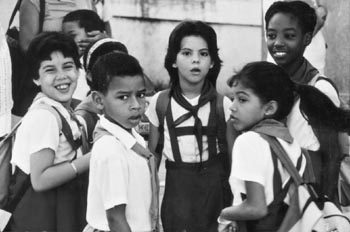
Havana Great Time
SJSU profs videocam their way through Cuba, finding
free markets, foreign cash and a burgeoning tourist industry
In May, San Jose State University professors Bob Gliner and Kathleen Densmore spent eight days wandering the streets of Havana and the surrounding countryside with a video camera and a microphone to capture the daily rhythm of Cuban life. They saw a Cuba redefining itself in the face of change, deciding how much of the free market to accept and which of its vaunted social principles to defend.
A half-hour documentary of their work, Cuba: On Its Own Terms, will air as a part of the "video I" series on KTEH-54 on Monday, Jan. 26, at 10:30pm.
In going to Cuba and filming whatever they saw, Gliner and Densmore hoped to bring back a slice more complex than the media's caricature of a decaying society kept on life-support by an aging dictator. What they found were people neither caught up in socialist ideology nor scrambling to leave the island. They found a proud and generally happy people with some of the same aspirations as suburban soccer moms.
"People down there are aware of the hardship, and they are hoping the economy gets better so their lives get better," Densmore says. "People there want to eat well, take vacations and give their kids violin lessons."
As Gliner and Densmore walk the streets and drive the countryside, people take breaks from their everyday lives to talk. In Havana, a woman crosses the street with a red flower she's pulled from her garden, hands it to Densmore and gives her a welcoming kiss on the cheek.
They visit a cigar factory and talk to the workers, who start with a diffuse pile of dried tobacco leaves and somehow transform the unruly wad into a perfectly cylindrical stogie. On one side of the warehouse, skilled artisans practice their craft. On the other side, young trainees spend nine months learning the trade before their handiwork is worthy of being sold as a world-renowned Cuban cigar.
"I've worked in the cigar factory 64 years," an old man says proudly. "Every day I seem to like my work better."
A younger man expresses similar pride. "It's not just a job or a profession," he says, "it's an art form. Our handiwork is the best in the world, no matter what." Of course, what the filmmakers neglect to mention is that cigar rollers live better than most Cubans thanks to an institutionalized black market of out-the-back-door cigar sales.
Next stop is an elementary school. Fathers deliver their sons to the schoolyard gate on the back of bicycles. One man gives his son a stern lecture before he kisses him on the cheek and sends him through the gate.
Inside, the children represent Cuba's multiethnic society. There are Cubans who look European, even Nordic, as well as Cubans who look Hispanic and Cubans who look African. The school is staffed with teachers, a nurse and a full-time physician who treats colds, inspects ears and eyes and gives monthly physical examinations. "Our center guarantees the health and safety of all children, even orphans," the directora boasts.
On a beach, the filmmakers talk to a 57-year-old Afro-Cuban man who lauds Castro for ending the racism that existed during the Bautista era.
"There are people today trying to destroy the revolution," he says. "Look at my color. I would not have been allowed on this beach. No way."
On paper, the interviews sound like canned soundbites from the forced idealism of the Socialist era. But these same people also have strong opinions about what the Cuban economy should produce and how the government could be run better. Astonishing to Americans, including these filmmakers, Cuba is a place where idealism never went out of style.
Yet capitalism is slowly trickling into Cuban society. Huge resort hotels in Havana have long entertained Canadian and European tourists. But now open-air markets sell produce and other merchandise at any price the market will support. Paladares, or privately owned mini-restaurants, have emerged in Cuban homes over the past year and now compete, in a very limited fashion, with state-owned restaurants.
The Cubans in the film seem to welcome the changes. One shopper says the prices are a little higher at the open-air market than in the government stores, but the selection is better.
For the most part, Cubans are very well informed about American society. After his visit, Gliner believes the central question Cubans face is the amount of capitalism they should embrace while keeping entitlements such as free education, food and health care. Cuba wants to be engaged in the global economy without giving up its soul.
"We are not saying everyone should have the same income; on the other hand we don't want people to have very different levels of income," says the former president of the Cuban Academy of Sciences. "It is a society based on generosity, not on greed."
| Home |
